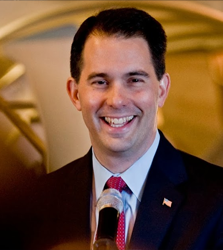
Scott Walker’s Challenges in a General Election
Stuart Rothenberg, one of the more prominent and insightful political analysts around, takes a look at Wisconsin Governor Scott Walker and the sort of challenges he faces in securing the Republican nomination and then, potentially, winning the general election in November 2016. Not surprisingly, Rothenberg sees a much easier path to the former than the latter.
Does Scott Walker Have What It Takes to Win in 2016?
Wisconsin Gov. Scott Walker is widely viewed as a top-tier hopeful for the GOP presidential nomination. But it’s less clear he has the right profile to knock off the likely Democratic nominee, former Secretary of State Hillary Rodham Clinton...
Walker, who has said he will make his announcement after the state passes a budget, wouldn’t start off as the favorite of most tea party conservatives or libertarians or establishment types, but he may well be able to attract some support from each of those constituencies. More importantly, as candidates drop out along the way, he has the potential ability to reel in those Republicans looking for an acceptable (even appealing) second or third choice.
Since he has never run for president before, we don’t yet know how Walker will handle the media scrutiny or perform in debates. But he should be competitive in fundraising, and his political team is experienced. Early polling certainly suggests he starts off as one of the favorites in the Republican race...
But after securing the nomination, Rothenberg suggests there would be considerable obstacles in Walker's path to defeating the presumed (by many, at least) Democratic nominee Hillary Clinton:
The Wisconsin governor is a mainstream conservative whose views on major issues are completely in sync with his party. That won’t have great appeal to voters, including younger ones, who didn’t support the past two Republican nominees...
Demographically, Walker is the quintessential white-bread candidate in the field — a straight arrow from the Upper Midwest whose father was a minister and whose family roots are in the United Kingdom and central Europe. He should do well with white voters, but that is no longer automatically a route to victory in a presidential race...
On the surface, at least, Walker doesn’t have particular appeal to Hispanics or Asians, two groups that are increasingly important in the electorate. Nor has he shown marked strength among African-Americans...
Rothenberg emphasizes the demographic challenges Walker might face, and seems to suggest that conservative views in and of themselves would be a drag on him in the general election, but acknowledges Walker could still be a competitive candidate:
Of course, if Walker can make the general election into a referendum on Obama’s failings or demonize Clinton the way Democrats did Romney, then the Wisconsin Republican certainly could narrowly win the general election. As a governor from the upper Midwest, he has plenty of assets in a national contest. At this early point, it would be ridiculous to dismiss Walker’s chances of winning the White House next year.
The overall assessment seems overly pessimistic, but is worth considering.



